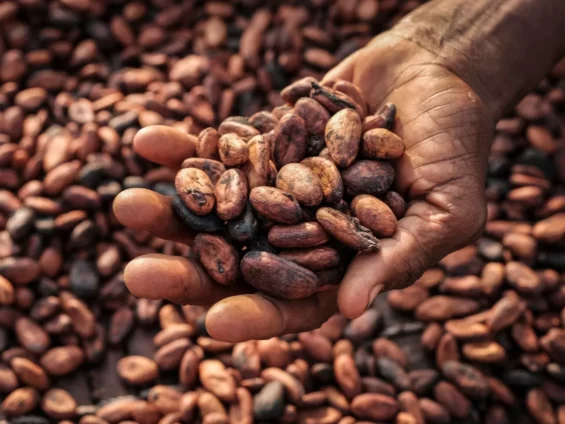Low prices and payment delays are pushing Ghana's cocoa farmers to sell to increasingly sophisticated smuggling rings, siphoning off production from border areas and raising doubt over next season's output, growers and officials told Reuters.
Failure to end the financing logjam and close the gap between Ghana's official price and the amount paid by traffickers, they said, risks deepening an already dire situation in the world's number two producer.
"From January to date, we have not been able to grade any cocoa," said Frank Amoah-Frimpong, state-owned marketing board Cocobod's top official in the eastern Volta and Oti border regions.
"It's pathetic. It's sad."
Global cocoa prices have climbed sharply since the start of this year, as poor weather, disease and illegal mining have led to disastrous harvests in Ghana and Ivory Coast - the world's top grower.
While cocoa is now trading at roughly double the price of a year ago, Ghana's government-fixed price for farmers has not reflected the increase.
That has handed an advantage to smugglers operating out of neighbouring Togo, a dozen farmers and officials from Cocobod and the security forces told Reuters.
Cocobod sells forward its crop and uses the average sale price to set the farmer price. As global prices were much lower when this season's cocoa was sold, lifting the price it pays farmers now would mean accepting a loss on the crop.
It still hiked the farmer price by nearly 60% in April, in part to discourage trafficking.
But local buyers said they cannot compete with smugglers willing to pay more than double the official price with little regard for bean quality.
Cocobod officials told Reuters that none of the cocoa produced in the Volta and Oti regions since January has been purchased by officially licensed buyers.
All of it has been trafficked, they say, and the zone has also become a conduit for smuggling of beans from other regions in Ghana.
A licensed buyer in eastern Ghana who asked not to be named out of fear of reprisals by criminal gangs said smuggling has picked up over the past three seasons.
From 28,000 bags of cocoa purchased in the 2020/21 season, the buyer managed to source just 870 so far this season.
"We've money. If someone tells us today that they have 1,000 bags, I will get money to pay on delivery," the buyer said. "But the farmers are selling to those who buy and send to Togo, because their price is higher."
Other licensed buying companies across the Volta and Oti regions have struggled due to what they say is a lack of financing from Cocobod. Many have simply closed down.
'ORGANISED CARTEL'
Joshua Dogboe, a farmer from eastern Ghana's Likpe area, said he was still owed money for cocoa he delivered to state-owned buyer PBC last season just weeks before it shuttered its local office.
"I have expenses to take care of and when (the smugglers) come with... money to buy, I will sell quickly," he told Reuters.
Cocobod has said it lost around 150,000 tons of cocoa production last season to smuggling as well as due to the destruction of plantations by illegal gold miners.
Neither Cocobod officials nor police would give an estimate of the current season's losses.
However, they said smuggling rings have grown bolder and more sophisticated and in some cases are being financed and operated by foreign nationals from Lebanon, China, France and Russia based in Togo.
Abu Seidu, head of Cocobod's Cocoa Health and Extension Division in the Volta and Oti regions, said farmers used to carry bags of cocoa across the mountainous border on motorbikes.
"Now you see a tipper truck loaded with cocoa and stone chippings on top as a disguise," he said.
"If you catch a truck with 800, 500 or 200 bags, it tells you that someone is now aggregating the cocoa... It's now an organised cartel."
Latest Stories
-
Egypt’s Al-Ahly part ways with coach Koller
10 minutes -
Rafatu Inusah elected onto GOC Board
3 hours -
SAMSON’S TAKE: AG okays demo, how refreshing?
3 hours -
Trump questions Putin’s desire for peace after meeting Zelensky at the Vatican
4 hours -
Legend of The Week – George Darko
4 hours -
Kounde strike wins Copa del Rey final for Barcelona
9 hours -
Is NPP crying more than the bereaved in the Chief Justice saga?
11 hours -
“Elements within NPP worked against me for supporting ‘Ken must go'” – Cynthia Morrison
12 hours -
IMF Boss commends finance minister for strong commitment to economic reform
12 hours -
Cynthia Morrison advises Ghanaian women to diversify their skills to build wealth
12 hours -
UK deports 43 immigration offenders to Ghana and Nigeria
13 hours -
Piwak Natural Health urges Akosombo victims to rebuild with new donation
13 hours -
Ghana’s Para athlete Gilbert Ampiah wins bronze at Marrakech Grand Prix 2025
13 hours -
6 dead in Adansi Dompoase crash involving VIP bus and sprinter
13 hours -
Saturday’s heavy rainstorm caused outages within our network – ECG
14 hours

